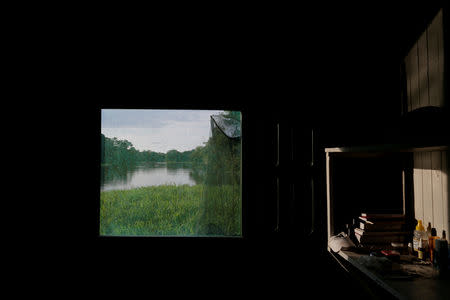Brazil's Bolsonaro plans more power plants in the Amazon: adviser
By Ricardo Brito BRASILIA (Reuters) - Brazil's presidential front-runner Jair Bolsonaro would tackle chronic energy shortages by expanding nuclear and hydroelectric power in the Amazon despite environmental concerns, the adviser overseeing his infrastructure plans told Reuters. Oswaldo Ferreira, one of several retired generals advising Bolsonaro, said, if he were elected, the government would also complete Brazil's corruption-plagued Angra 3 nuclear power station on the coast between Sao Paulo and Rio de Janeiro. He said a Bolsonaro administration would complete the massive Belo Monte hydro dam on the Xingú river, a tributary of the Amazon, which has been criticized for displacing indigenous communities and causing damage to the sensitive biome. Shelved plans for other dams in the Amazon basin could also be revived, he said. Far-right Bolsonaro easily outpaced his leftist rival Fernando Haddad in Sunday's first-round vote, taking 46 percent compared to Haddad's 29 percent, but short of the majority needed to avoid an Oct.28 runoff. A Wednesday poll showed Bolsonaro 16 percentage points ahead. At a Thursday press conference in Rio de Janeiro, Bolsonaro confirmed that Chicago University-trained economist Paulo Guedes would be his economy minister, overseeing a "super ministry" combining the current finance, planning and development ministries. He also said retired army general Augusto Heleno Pereira would be defense minister and conservative congressman Onyx Lorenzoni his chief of staff. AMAZON PROTECTION Private investors would be called on to help build the infrastructure Brazil badly needs, Ferreira said. The country is one of the world's top food exporters, but the poor state of roads and lack of railways makes getting goods to ports slow and expensive. Popular with Brazil's powerful evangelical and farming lobbies, Bolsonaro, 63, has pledged to pull Brazil out of the Paris Agreement climate deal due to disagreements over how the Amazon should be protected. His top agriculture adviser, Nabhan Garcia, told Reuters on Tuesday that Bolsonaro's government would slash fines for farmers who break environmental laws in sensitive areas like the Amazon rainforest. Environmentalists are also concerned about Bolsonaro's plans to stop recognizing new native reservation lands and to merge the agriculture and environment ministries under the control of a farm lobby representative. Garcia, a well-known conservative voice in agriculture in Brazil, had been floated in the local press as a candidate to head that ministry. Bolsonaro said on Thursday that Garcia would not have that post, without elaborating. Ferreira said hundreds of unfinished infrastructure projects, including railways and roads for exporting grains, will be studied and completed if viable with the help of investors through public-private partnerships. But energy will be a priority. "If Brazil is to return to the rates of growth that we all want, there will be a need for energy that cannot be supplied from other sources," he said in a Wednesday night telephone interview. Bolsonaro said on Thursday that his team had an economic agenda "practically ready" to present upon taking office in January, if he wins, including a tax overhaul that would not raise taxes but rather cut red tape. Ferreira said Bolsonaro favored privatizing the transmission and distribution units of Brazil's largest utility Centrais Eletricas Brasileiras SA, known as Eletrobras, but retaining state control of power generation. He emphasized that a Bolsonaro administration would focus on "clean" energy from hydropower to wind and solar, and that environmental concerns would be given "full attention." Ferreira struck a less moderate tone in an interview published on Thursday by newspaper O Estado de S.Paulo, where he described environmental regulators as a nuisance. When the army was responsible for opening up roads in the Amazon during the 1964-1985 military regime, trees could be felled without permission, but today to cut down one tree "a handful of people will come and bother you," he told the paper. (Reporting by Ricardo Brito in Brasilia and Rodrigo Viga Gaier in Rio de Janeiro; Writing by Anthony Boadle; Editing by Christian Plumb, Daniel Flynn and Rosalba O'Brien)


